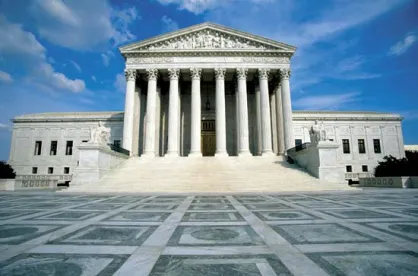In a 6-3 ruling, the U.S. Supreme Court held that bankruptcy courts have the authority to adjudicate Stern claims so long as the litigant parties provide “knowing and voluntary consent.” This decision in Wellness International Network, et. al. v. Richard Sharif provides much needed guidance as to the breadth and applicability of the Supreme Court’s 2011 decision in Stern v. Marshall.
Stern v. Marshall limited the power of the bankruptcy courts by restricting their rights to enter final judgments on non-bankruptcy related common law or equitable claims. Under Stern, only federal court judges operating under the Judicial Branch of the U.S. Government (i.e. Article III of the Constitution) have the authority to adjudicate such claims; Bankruptcy court judges only have the authority to issue reports and recommendations that are subject to de novo review by a district court. Following the Stern decision, a circuit split emerged regarding whether a bankruptcy court judge may, with the consent of the parties, issue a final order that would otherwise require final adjudication by an Article III court.
Majority Opinion
Wellness International settled the circuit split. Judge Sotomayor, writing for the majority, wrote that “Article III is not violated when the parties knowingly and voluntarily consent to adjudication by a bankruptcy judge.” Important to the Court’s analysis was the fact that “[a]djudication based on litigant consent has been a consistent feature of the federal court system since its inception. Reaffirming that unremarkable fact, we are confident, poses no great threat to anyone’s birthrights, constitutional or otherwise.”
The Court rejected the contention that such consent must be express, explaining that “[n]othing in the Constitution [or the relevant statute] requires that consent to adjudication by a bankruptcy court be express.” Rather, the Court held that implied consent would suffice for adjudication by bankruptcy courts, but that such “litigant’s consent – whether express or implied – must still be knowing and voluntary.” Thus, the issue of whether consent has been implied by the actions of the parties will be key to future decisions.
Dissent
Chief Justice Roberts, joined by Justice Scalia and Justice Thomas (in part), dissented. The dissent argues that the Court need not decide the issue of the litigant’s consent to adjudication by the bankruptcy court because the applicable claims at issue were not Stern claims, but were instead “core” claims within the bankruptcy court’s jurisdiction. Nonetheless, the dissent disagreed with the majority opinion on the consent issue arguing that “consent .. cannot cure a constitutional violation.” According to the dissent, a party has “has no authority to compromise the structural separation of powers or agree to an exercise of judicial power outside Article III.”


 />i
/>i

